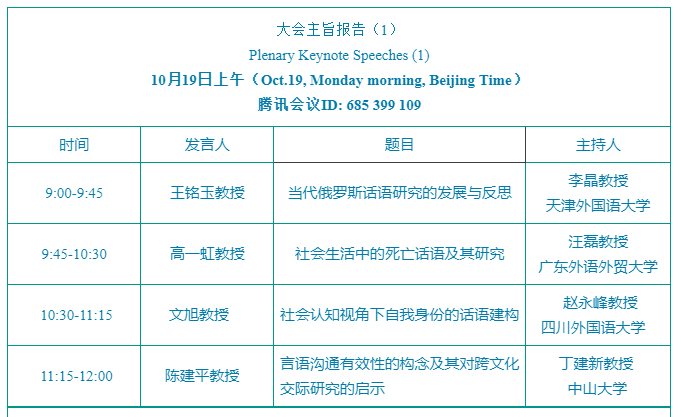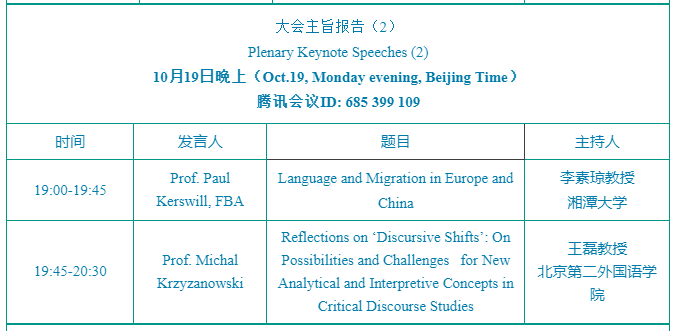1500 阅读 2020-10-16 11:05:14 上传
会议讲座: 会议
时 间: 2020.10.19~2020.10.20
形 式: 在线
主办单位: 中国语言学会社会语言学分会
人 数: 300
第二届社会语言学高端国际论坛(三号通知)

中国语言学会社会语言学分会主办的“第二届社会语言学高端国际论坛”将于10月19-20日如期线上举行。本次论坛旨在搭建国际间学术交流平台,促进社会语言学最新研究成果交流,推动社会语言学理论和方法创新,帮助社会语言学青年学者成长。欢迎国内外社会语言学研究者参加。
今天向大家介绍论坛主旨报告时间安排、主旨报告嘉宾及各自报告摘要。后续内容会相继推出,敬请关注。

主旨报告时间安排




主旨报告嘉宾介绍
陈建平教授,博士、教授、博士生导师。毕业于广州外国语学院英语专业;先后获香港中文大学应用语言学哲学硕士学位、英国兰开斯特大学现代社会史硕士学位、北京外国语大学英语语言文学博士学位。历任广东外语外贸大学副校长、党委副书记(1995-2015)、教育部人文社科重点研究基地广东外语外贸大学外国语言学及应用语言学研究中心主任(2002-2005);曾任全国高等学校外语专业教学指导委员会委员/分委员会副主任委员(1992-2012)、中国英语教学研究会副会长(2000-2014)等。主持完成全国哲学社科规划项目(青年)、全国哲学社科规划项目(结项获优秀等级)、教育部人文社科研究项目、广东省哲学社科规划项目和教育部人文社会科学重点研究基地项目(结项获优秀等级),各一项。在研科研项目为:教育部人文社会科学重点研究基地重大项目《跨文化语篇能力研究》。主要科研成果有专著《中国英语学习研究》(高等教育出版社2005年),《语言与社会》(编著)(高等教育出版社2011年),《翻译与跨文化交际》(编著)(外语教学与研究出版社2012)以及国际、国内学术刊物论文多篇。曾获国家级教学成果二等奖(合作)、广东省省级教学成果一等奖(合作);1991年被国家教委和人事部评为“在工作中做出突出贡献的回国留学人员”;1993年起享受政府特殊津贴。
言语沟通有效性的构念及其对跨文化交际研究的启示
陈建平 广东外语外贸大学
本发言旨在讨论哈贝马斯的交往行为理论在话语研究领域的应用,探讨该理论在话语机制性研究中的理论及实践价值,尤其是哈贝马斯关于言语沟通有效性的构念在话语研究中的应用价值;其具体目的在于探索建立适用于话语机制研究的分析框架并通过举例分析中外两则记者招待会上的互动话语个案,检验上述分析框架的适用性,进一步探讨言语沟通有效性构念对跨文化交际研究的启示及其应用价值,从交往互动理论的视角寻找可适用于跨文化互动研究的理论及方法参考。
高一虹,北京大学外国语学院教授、博士生导师、外国语言学及应用语言学研究所所长、《语言学研究》主编。主要研究领域为社会语言学,曾任中国社会语言学会会长(2008-2010)。目前主要从事死亡话语的研究,主持国家社科基金重点项目 “当代中国‘死亡话语’及发展考察”(批准号19AYY001)。
社会生活中的死亡话语及其研究
高一虹、赵娜、徐继菊 北京大学
随着经济的发展、人口老龄化的加剧、医学模式转型等背景,我国传统文化中只谈生不谈死的禁忌状况正在发生变化,“死亡”正在向话语化、公开化的方向转变。“死亡话语”(高一虹,2019)期待社会语言学者的关注。本文分健康交流、临终和身后规划、生死教育三大领域梳理了我国相关语境中死亡话语的实践和研究状况。我们查找了中国知网2000-2019年间死亡相关中文研究论文,尤其分布可见,语言视角的研究20年来仅占研究总数的2.4%;在坏消息告知、死亡教育绘本话题的研究中占有一定比例优势,对其他问题的关注很少。近年来,社会语言学视角的死亡话语研究有所增加。文章呼吁对“死亡话语”的社会语言学研究,并对未来的具体方向提出了建议。
Professor Michał Krzyżanowski holds a Chair in Media and Communication Studies at Uppsala University, Sweden. He is also a Research Professor at Department of Communication & Media at the University of Liverpool, UK and its ‘Discourse and Society’ Research Group. Michał is one of the internationally leading experts in critical discourse studies of political communication, media and journalism. His key research interests are in dynamics of right-wing populist discourse, in mediation and normalisation of racism and of wider politics of exclusion as well as in diachronic and synchronic analyses of discourses and imaginaries of crisis in European and global media. Michał is the Editor-in-Chief of the international Journal of Language and Politics and a co-editor of the Bloomsbury Advances in Critical Discourse Studies book series.
Reflections on ‘Discursive Shifts’: On Possibilities and Challenges for New Analytical and Interpretive Concepts in Critical Discourse Studies
Michał KrzyżanowskiUppsala University, Sweden
Paul Kerswill is Professor of Sociolinguistics at the University of York in the UK; he has previously held positions at the Universities of Durham, Cambridge, Reading and Lancaster. His doctoral research in Bergen in Norway initiated his interest in the linguistic outcomes of migration. This was followed by a study of the dialect of the New Town of Milton Keynes in Britain and a new, mixed English dialect in the capital city, Multicultural London English, which is a youth language resulting from migration mainly from the Global South. His collaborators include Jenny Cheshire, Sue Fox, Eivind Torgersen and Ann Williams. A parallel track over the past twenty years has been his interest in language and development in West Africa. He was elected a Fellow of the British Academy in 2017.
Language, migration and the nation in Europe and China: fragmentation and integration
Paul Kerswill, University of York
Europe and China are two large, diverse geographical entities strongly differentiated by their state formation and ideologies. While Europe has myriad nation states, some no more than a couple of hundred years old and many very small, China has for millennia had a powerful centralising ideology. Both entities are also multilingual, with similar numbers of languages: 200 in Europe and – despite being a single polity – 300 in China. I want to consider the relationship between the fact that migration in Europe today mainly involves people moving across national and linguistic borders, this is not so in China. Chinese migrants move across a region with local languages, but with a strong, well-supported national language. In this talk, I consider migration flows which have taken place in the last 40 years. Starting with Europe, we see the migration of people from all over the world, particularly from previously colonised countries, such as Algeria or Morocco in France, or Jamaica, India and West Africa in the UK. This has massive consequences for the language ecology of the host countries - that is, which languages are spoken by whom and for what purposes, and we can see differences between the different countries. It also has consequences for the host languages themselves – I will discuss German, Norwegian and English – because new, mixed versions have arisen. China has seen one of the greatest migrations ever recorded. Despite the hegemony of the national language, different dialects are now in contact as never before, and we see the effects of this contact on these dialects, as well as an increase in code-switching and (ironically) in the use of the national language. I will cite recent studies from a number of Chinese provinces. Finally, I contrast the situations in Europe and in China.
田海龙,博士,天津外国语大学教授,博士生导师。天津市人文社科重点研究基地天津外国语大学语言符号应用传播研究中心常务副主任,《天津外国语大学学报》常务副主编,学校外国语言学及应用语言学二级学科学术带头人。学术兼职有:中国语言学会社会语言学分会会长、中国英汉语比较研究会话语研究专业委员会副会长兼秘书长、国际学术期刊Journal of Language and Politics编委、系列丛书Discourse Approach to Politics,Society and Culture(John Benjamins)顾问委员会成员、系列丛书《南开话语研究》总主编、辑刊《话语研究论丛》、《中国社会语言学》主编。研究兴趣包括社会语言学和话语研究。出版著作有《批评话语分析:阐释、思考、应用》,译著《语言与全球化》。
A Social-linguistic Understanding of the Origin of Sociolinguistics
Hailong Tian Tianjin Foreign Studies University
王铭玉,二级教授、博士生导师、博士后合作导师、天津外国语大学原副校长、翻译与跨文化传播研究院院长、中国逻辑学会符号学专业委员会主任委员、中国语言与符号学研究会会长、中央编译局国家高端智库核心团队成员、天津市特聘教授、天津市杰出津门学者、天津市教学名师、俄罗斯普希金奖章获得者、俄罗斯“友谊与合作”奖章获得者,享受国务院特殊津贴。曾任《解放军外国语学院学报》副主编、《外语学刊》主编,现任《语言与符号》《中译外研究》主编,国内10个外语刊物的编委、《中国社会科学》审稿专家;兼任全国外语教学指导委员会俄语分会副主任委员、中国翻译协会对外话语体系研究委员会副主任、天津市外文学会会长、京津冀MTI教育联盟联盟长、国家教材委员会专家委员会委员、教育部义务教育俄语课标组组长、全国翻译专业资格(水平)考试俄语专家委员会副主任等职,12所大学和研究机构的客座教授和兼职研究员。在《人民日报》《光明日报》《中国社会科学》《外语教学与研究》等重要报纸刊物公开发表论文110余篇,出版46部专著、译著和教材。先后完成省部级以上课题8项,2次获得国家社会科学基金重点项目。
当代俄罗斯话语研究的发展与反思
王铭玉、康喆文 天津外国语大学
俄罗斯话语研究与西方理论有着渊源关系,但本土语言学色彩浓厚,经过五六十年的发展已具有一定规模。在“人类中心论”范式的指导下,俄罗斯话语研究成为语言文化学、认知语言学、社会语言学等交叉学科的热点研究对象。在话语研究领域逐步扩大的同时,也暴露出话语理论研究系统性不强,研究方法较为单一,研究目的社会导向性不足等问题。
文旭,二级教授,博士生导师,西南大学外国语学院院长。教育部“长江学者奖励计划”特聘教授,国务院政府特殊津贴获得者;国家社科基金会评专家;全国翻译专业学位研究生教指委委员,教育部英语分指委委员。中国认知翻译学专业委员会会长,中国认知语言学专业委员会副会长,中国语用学专业委员会副会长,重庆市外文学会会长。Cognitive Linguistic Studies及Asian-Pacific Journal of Second and Foreign Language Education主编;Language Sciences, Review of Cognitive Linguistics, Intercultural Pragmatics,《中国外语》等期刊编委。国家社会科学基金重大项目“认知语言学理论建设与汉语的认知研究”(15ZDB099)首席专家;发表论文170多篇,出版专著或教材数十部,主持国家级等各级教学科研基金项目20余项。主要研究兴趣为认知语言学、语用学、认知翻译学、外语教育学。
社会认知视角下自我身份的话语建构
文旭 西南大学
我是谁?这是人生的终极疑问,人人都无法回避。关于这个问题,我不仅仅是指身体的我,还有心理的我,道德的我,社会的我,等等。在言语交际中,自我是如何通过话语来建构自己身份,标明自己的信念、立场、观点等。本讲从社会认知视角,探讨说话人自我身份的话语建构,提出自我在特定语境中的目的、认知与自我身份建构的话语具有密切的关系,也就是说,人们的社会认知决定了言语交际中自我身份的话语建构。
Qing Zhang (Ph.D. Linguistics (Sociolinguistics), Stanford University) is an Associate Professor in the School of Anthropology and affiliated faculty member in East Asian Studies and Second Language Acquisition and Teaching at the University of Arizona. She trains undergraduate and graduate (M.A. and Ph.D.) students in sociolinguistics and linguistic anthropology. She is also a faculty advisor in the Joint Ph.D. Program in Anthropology and Linguistics. Her research examines the constitutive role of language in contexts of sociopolitical change and globalization with a focus on China. Her research interests include sociolinguistic variation and change, language and identity, language and gender, language ideology, language policy, and language in the media. Her works have been published in leading journals such as Language in Society, Journal of Linguistic Anthropology, Journal of Sociolinguistics, Journal of Language and Politics, and in edited volumes on language and globalization, language policy and ideology, and new discourses in contemporary China. Her book, Language and Social Change in China: Undoing Commonness through Cosmopolitan Mandarin (Routledge 2018), is an example of Third Wave Variationist Sociolinguistics and offers a model for a style-based approach to sociolinguistic change that embeds language variation and change in broader social and political processes. She serves as an editorial board member for Sociolinguistic Studies and Linguistic Compass. She is also a proposal reviewer for the National Science Foundation (Linguistics Program).
Sociolinguistic variation and changing cultural frameworks of value
Qing Zhang University of Arizona
Recent development in variationist sociolinguistics adopts an integrated perspective by treating linguistic variation as part of a larger semiotic system and linguistic change as integral to social change. While a large number of studies focuses on sociolinguistic variation in the production of styles, more research remains to explore linking variation to broader social-political concerns. This paper contributes to the latter area of scholarship by examining the ways through which enregistered variation participates in changing cultural frameworks of value. Drawing on data from Mandarin Chinese in the rapidly changing social landscape of China, the paper demonstrates that sociolinguistic variation is swept up in broader cultural frameworks of value through 1) its use in the performance of shifting personae and 2) construals of the qualities associated with such personae in metasemiotic discourse.
赵蓉晖,上海外国语大学教授、博士生导师、研究生院院长,国家语委科研基地暨国家语言文字智库“中国外语战略研究中心”执行主任,国家级“语言政策与语言教育”学科创新引智基地负责人,教育部哲社重大攻关项目首席专家。主要研究领域为社会语言学、语言政策与语言教育、语言学史,致力于开展语言学与社会科学相融合的研究工作,倡导经世致用的治学理念。出版专著文集等10部,在《中国社会科学》等刊物发表论文近70篇,主持国家哲社基金项目等15项,参与省部级以上科研项目12个。
曾在美国马里兰大学、香港大学、日本成蹊大学访学。先后入选“教育部新世纪优秀人才”“上海领军人才”“楚天学者”“鉴湖学者”计划。主要学术兼职包括中国语言学会常务理事、中国社会语言学会副会长、中国语言学会语言政策与语言规划专业委员会副会长、中国研究生教育学会理事、上海研究生教育学会常务理事,担任上海外国语大学《语言政策与语言教育》编委会主任、俄罗斯科学院《社会语言学》与商务印书馆《语言战略研究》等期刊编委。正在主编《世界语言生活状况报告》丛书、外语战略研究丛书。
Linguistic Capabilities from the Perspective
of Area Studies: Status and Intention
Zhao Ronghui Shanghai International Studies University











